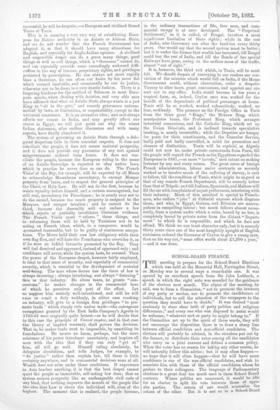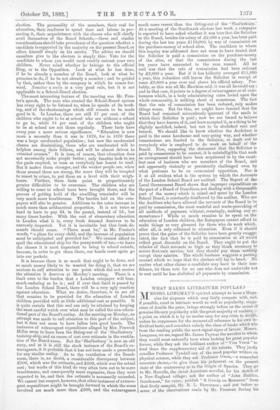SCHOOL-BOARD FINANCE. T HE meeting to prepare for the School-Board Elections
which was held at the Memorial Hall, Farringdon Street, on Monday was in several ways a remarkable one. It was opened by an excellent speech from Sir John Lubbock, a speech in which the right note was sounded for the guidance of the electors next month. The object of the meeting, he said, was to form a Committee, "not to promote the interests of any party or section, nor to promote the candidature of individuals, but to call the attention of the ratepayers to the question they would have to decide." It was desired "most anxiously to steer clear both of party politics and religious differences ;" and every one who was disposed to assist would be welcome, "whatever sect or party he might belong to." If the Committee act up to the spirit of these words, they will not encourage the disposition there is to draw a sharp line between official candidates and non-official candidates. The electors will probably be advised, in the circulars put out by the former, to distribute their votes among all the candidates who carry on a joint canvass and defend a common policy. When the voter has no reason for taking any other course, he will naturally follow this advice ; but it may often happen— we hope that it will often happen—that he will have more confidence in one of the non-official candidates, and wish to associate him with those of the official candidates whom he prefers to their colleagues. The language of Parliamentary elections is a great deal too much used in these School Board contests. Where politics are concerned, it would be idle for an elector to split his vote between those of oppo- site parties. The return of one would neutralise the return of the other. But it is net so in a School-Board election. The personality of the members, their zeal for education, their readiness to spend time and labour in pro- moting it, their acquaintance with the classes who will chiefly avail themselves of the Board Schools,—thesa and similar considerations should take precedence of the question whether a candidate is supported by the majority on the present Board, or offers himself simply on his merits. The advice we should ourselves give to the electors is simply this : Vote for the candidate to whom you would most readily entrust your own children. Never mind whether he belongs to the official Ring, or to the Opposition. Look at what he has done, if he be already a member of the Board, look at what he promises to do, if he be not already a member ; and be guided by that, rather than by the company in which he comes for- ward. Noscitur a mails is a very good rule, but it is not applicable ton School-Board election.
The most interesting feature of the meeting was Mr. Fors- ter's speech. The man who created the School-Board system has every right to be listened to, when he speaks of its work- ing, and of the shortcomings which still remain to be made good in it. In London, there are still 27 per cent, of the children who ought to be at school who are without a school to go to, while 44 per cent. of the children who ought to be at school are not there regularly. These facts have every year a more serious significance. "Education is now more a necessity than it was in 1870, for in 1870 there was a large uneducated population ; but now the uneducated classes are diminishing, those who are uneducated will be helpless among their fellows, and will be almost driven to criminal courses." It is true, of course, that education does not necessarily make people better ; only fanatics look to see the gaols emptied, as soon as everybody has learnt to read. But it makes them stronger, and the weaker people are, when those around them are strong, the more they will be tempted to resort to crime, to put them on a level with their neigh- bours. Further, these facts point to proportionately greater difficulties to be overcome. The children who are willing to come to school have been brought there, and the process of getting hold of the unwilling remainder will be very much more troublesome. The burden laid on the rate- payers will also be greater. Additions to the rates increase in much more than arithmetical proportion. It is not twice as hard to have to pay 6d. in the pound, instead of 3d., but many times harder. With the cost of elementary education in London what it is, every fresh demand deserves to be narrowly inspected. Yet it is inevitable but that fresh de- mands should come. "There must be," in Mr. Forster's words, "a place for every child, and the increase of population must be anticipated and provided for." We cannot afford to spoil the educational ship for the pennyworth of ,tar,—to leave the blesses it is most important to bring to school outside, because, in order to get them there, our hands must again go into our pockets. It is because there is so much that ought to be done, and so much money likely to be wanted for doing it, that we are anxious to call attention to one point which did not receive the attention it deserves at Monday's meeting. There is a limit even to the burden that a London ratepayer will bear, much-enduring as he is ; and if ever that limit is passed by the London School Board, there will be a very ugly reaction .against education. What we desire, therefore, is to see all that remains to be provided for the education of London. children provided with as little additional coat as possible. It is quite certain that this end can only be attained by keeping the most careful witch over what may be called the non-educa- tional part of the Board's outlay. At the meeting on Monday, an attempt was made to call attention to this part of the subject, but it does not seem to have fallen into good hands. The instances of extravagant expenditure alleged by Mrs. Fenwick Millar seem to have been the fitting-out of the 'Shaftesbury' training-ship, and an excess of cost over estimate in the ventila- tion of the Board-room. But the Shaftesbury 'is now an old story, and as it is still the stock instance of the Board's ex- travagance, it is probable that it has not been made a precedent for any similar outlay. As to the ventilation of the Board- room, there is, no doubt, a considerable discrepancy between £300, which was the estimate, and £600, which was the actual cost ; but works of this kind do very often turn out to be more troublesome, and consequently more expensive, than they were expected to be, and then the estimate is necessarily exceeded. We cannot but suspect, however, that other instances of extrava- gant expenditure might be brought forward in which the sums involved are much more than £300, and the extravagance much more recent than the fitting-out of the ' Shaftesbury.' At a meeting of the Southwark electors last week, a ratepayer is reported to have asked whether it was true that the Solicitor to the Board, besides his salary of £2,000 a year, has been paid during the last ten years £110,000, by way of commission on the purchase-money of school sites. The candidate to whem this inquiry was addressed does not seem to have denied that, the Solicitor is paid a commission on the purchase-money of the sites, or that the commissions during the last ten years have amounted to the sum named. All he said was that the rate of commission had been reduced by £2,000 a year. But if it has hitherto averaged R11,000, a year, this reduction still leaves the Solicitor in receipt of some £9,000 a year over and above his official salary. Pro- bably, as this was all Mr. Hawkins said, it was all he could say ; and in that case, it points to a degree of extravagance or 'of care- lessness which, in a body administering rates levied upon the whole community, is nothing short of monstrous. The fact that the rate of commission has been reduced, only makes things worse. But for this, we might have fancied that the Board had remained miraculously ignorant of the mode in which their Solicitor is paid; • now we are forced to believe' that they have known of it, and have accepted it, as a thing to be slightly modified, indeed, but not to be abolished root and branch. We should like to know whether the Architect is paid in the same handsome and easy-going way, and whether commissions are limited to the Solicitor, or dealt out to everybody who is employed to do work on behalf of the Board. Now, supposing the statement that the Solicitor is paid by commission to be correct, it is unintelligible that such an arrangement should have been acquiesced in by the excel- lent men of business who are members of the Board, and not apparently violently or persistently challenged even by what professes to be an economical opposition. Nor is it at all evident what is the system by which the Accounts of the London School Board are audited. The Report of. the Local Government Board shows that improper expenditure on the part of a Board of Guardians, not dealing with a thousandth part of the money which is raised and spent by the Lendon School Board, is constantly disallowed by the auditor. Who are the Auditors who have allowed the servants of the Board to be paid by commission, the most wasteful and waste-provoking of all methods of payment, without, seemingly, making rnany re. monstrance? While so much remains to be spent on the education of London children, the Ratepayers cannot afford to, make things so very pleasant for those who do work which, after all, is only collateral to education. Even if it should prove that the gains of the Solicitor have been greatly exagge- rated, the fact that he is paid by commission at all would reflect great discredit on the Board. They ought to put the salaries of their servants as high as they think necessary to sedum first-rate service, but they should pay them nothix4 except their salaries. The whole business suggests a parting counsel which we hope that the electors will lay to heart. ,NO matter what other claims a candidate may have to their con- fidence, let them vote for no one who does not undertake net to rest until he has abolished all payments by commission.



































 Previous page
Previous page